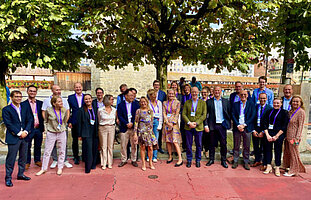Press release of the Heidelberg University Hospital (UKHD)
Researchers from the Heidelberg University Hospital and the University of Lucerne, as well as international scientists, patient representatives, and European cancer societies, have bundled together scientific data and their expert knowledge on the surgical management of lymph nodes in breast cancer / The recommendations aim to avoid unnecessary removal of lymph nodes and spare patients chronic lymphedema / A publication can be found in the open-access journal eClinicalMedicine by The Lancet
Preoperative chemotherapy for breast cancer can significantly shrink the tumor's size and metastatic lymph nodes until the surgery is performed. Thus, breast surgery has the potential to avoid the complete excision of the lymph nodes in the armpit and can reduce the risk of burdening side effects such as lymphedema of the arm. A multidisciplinary consortium of European cancer societies, international medical institutions with Heidelberg participation, and patient representatives addressed the challenges of clinical axillary lymph node management in early breast cancer. Leading experts voted on all major issues and provided recommendations for clinical application.
Five work packages have been developed, following the patient's journey from diagnosis to local therapy of the axilla and addressing specific clinical scenarios. "The benefits of preoperative chemotherapy for breast cancer are not always sufficiently realized. Published data show that mastectomies and complete lymph node removal are still performed too often. A reduced surgical removal of lymph nodes is only partially realized, even with good preoperative results," reports Professor Dr. Peter Dubsky, the head of the Breast Center at the Hirslanden Klinik St. Anna in Lucerne, titular professor at the University of Lucerne and manager of the consortium. Dr. André Pfob from the Heidelberg University Hospital (UKHD) and joint first author of the publication with Dr. Orit Kaidar-Person from Tel Aviv, Israel, continues: "Removing fewer lymph nodes in the axilla reduces the risk of harming lymphatic drainage from the arm. Therefore, the international working group created a new medical concept with practical recommendations to complement existing guidelines, which aims to prevent unnecessary surgical removal of lymph nodes and can be quickly integrated into clinical practice."
It was possible to achieve an agreement in a previously controversial debate and to develop a far-reaching practical guide at a conference in Lucerne in September 2022. The participating experts voted on 72 statements and reached a consensus (75 percent or more agreement) in 52.8 percent, a majority (51 to 74 percent agreement) in 43.1 percent and no decision in 4.2 percent. "Imaging and standardized pathology of the lymph nodes should be a prerequisite for planning local and systemic therapy in breast cancer patients, according to the voting results. In most of the scenarios discussed, removing all axillary lymph nodes could be replaced by targeted removal of a few lymph nodes, such as the sentinel lymph nodes," Dr. Pfob summarized. "The outcome of a lymph node surgery has complex implications for radiation, chemotherapy, or hormone therapy. These should be tailored to the individual patient." To monitor the success of the recommendations for individual women, the risk of cancer recurrence and side effects are recorded and evaluated.
The summary of the recommendations is called "The Lucerne Toolbox." The project was sponsored by the Hirslanden Klinik St. Anna in Lucerne. The first edition of the Lucerne Toolbox, which addressed the issue of mastectomy, was already published in 2021.
The publication
Orit Kaidar-Person, André Pfob, Oreste Davide Gentilini, Bettina Borisch, Ana Bosch, Maria João Cardoso, Giuseppe Curigliano, Jana De Boniface, Carsten Denkert, Nik Hauser, Jörg Heil, Michael Knauer, Thorsten Kühn, Han-Byoel Lee, Sibylle Loibl, Meinrad Mannhart, Icro Meattini, Giacomo Montagna, Katja Pinker, Fiorita Poulakaki, Isabel T. Rubio, Patrizia Sager, Petra Steyerova, Christoph Tausch, Trine Tramm, Marie-Jeanne Vrancken Peeters, Lynda Wyld, Jong Han Yu, Walter Paul Weber, Philip Poortmans, Peter Dubsky. The Lucerne Toolbox 2 to optimise axillary management for early breast cancer: A Multidisciplinary Expert Consensus. eClinicalMedicine, 2023, https://doi.org/10.1016/j.eclinm.2023.102085
Image Description
An international group of experts developed a practical web guide for treatment planning in early breast cancer with their Lucerne Toolbox.
Foto: Peter Dubsky
Further information
P. Dubsky et al. Breast conservation and axillary management after primary systemic therapy in patients with early-stage breast cancer: the Lucerne toolbox. Lancet Oncology, 2021, https://doi.org/10.1016/S1470-2045(20)30580-5
Breast Cancer Center of the Women's Clinic at the Heidelberg University Hospital
Breast Center at the Hirslanden Clinic St. Anna in Lucerne
You can also find the press release (available in German only) online in the UKHD Newsroom.
Heidelberg University Hospital and Faculty of Medicine: Internationally Renowned Patient Care, Research and Teaching
Heidelberg University Hospital (Universitätsklinikum Heidelberg, UKHD) is one of the largest and most prestigious medical centers in Germany. The Medical Faculty of Heidelberg University (Medizinische Fakultät Heidelberg, MFHD) belongs to the internationally renowned biomedical research institutions in Europe. Both institutions have the common goal of developing new therapies and implementing them rapidly for patients. Heidelberg University Hospital and the Medical Faculty of Heidelberg University employs around 14.500 employees and is committed to providing trainings and qualifications. Every year, around 86,000 patients and more than 1.100.000 outpatient cases are treated in more than 50 clinical departments with almost 2.500 beds. Together with the German Cancer Research Center (Deutsches Krebsforschungszentrum, DKFZ) and the German Cancer Aid, the UKHD established the first National Center for Tumor Diseases (NCT) in Heidelberg. The goal is to provide care at the highest level as an oncology center of excellence and to rapidly transfer promising approaches from cancer research to the hospital. In addition, the UKHD operates in partnership with the DKFZ and the University of Heidelberg the Hopp Children’s Cancer center Heidelberg (KiTZ), a unique and nationally known therapy and research center for oncological and hematological diseases in children and adolescents. The Heidelberg Curriculum Medicinale (HeiCuMed) is one of the top medical training programs in Germany. Currently, there are about 4.000 future physicians studying in Heidelberg.
www.klinikum.uni-heidelberg.de
Julia Bird
Comm. Press Officer
Comm. Head of Corporate Communications
Tel. +49 6221 56-7071
Fax. +49 6221 56-4544
julia.bird@med.uni-heidelberg.de






